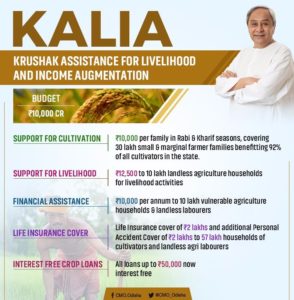KALIA Scheme and Its Significance
What is the News?
Instead of announcing farm loan waiver like other States, the Odisha Cabinet approved the Krushak Assistance for Livelihood and Income Augmentation (KALIA) scheme amounting to ?10,000 crore to accelerate agricultural prosperity in the State and to reduce poverty.
KALIA is progressive, inclusive and will make a direct attack on poverty by way of massive investment in the agriculture sector and making benefits reach the most needy through direct benefit transfer (DBT) mode.
About KALIA Scheme
 Krushak Assistance for Livelihood and Income Augmentation (KALIA)
Krushak Assistance for Livelihood and Income Augmentation (KALIA)- The scheme provides an amount of Rs. 10,000 per family at the rate of Rs. 5,000 each for Kharif and Rabi seasons shall be provided as financial assistance for taking up cultivation.
- It also has a component for livelihood support for landless households and the landless households will have the option of selecting any of the units.
- This assistance is for five crop seasons spanning three years from 2018-19 to 2021-22, so as to ensure comprehensive coverage.
- The scheme, among others, will particularly benefit scheduled caste and scheduled tribe households.
- The deserving families will be identified and selected by gram panchayats.
- Further, life insurance cover of ?2 lakh and additional personal accident cover of ?2 lakh will be provided to both cultivators and agricultural labourers covering about 57 lakh households.
Significance of KALIA Scheme
- All the small and marginal farmers of the State (92% cultivators) will be covered under the scheme.
- The farmers will have complete independence to take up interventions as per their needs.
- KALIA is progressive, inclusive and will make a direct attack on poverty by way of massive investment in the agriculture sector and making benefits reach the most needy through direct benefit transfer (DBT) mode.
- Under this initiative, 10 lakh landless households will be supported with a unit cost of ?12,500 to take up activities like small goat rearing units, mini layer units, duck units, fishery kits for fishermen and women, mushroom cultivation and bee keeping.

 Krushak Assistance for Livelihood and Income Augmentation (KALIA)
Krushak Assistance for Livelihood and Income Augmentation (KALIA)